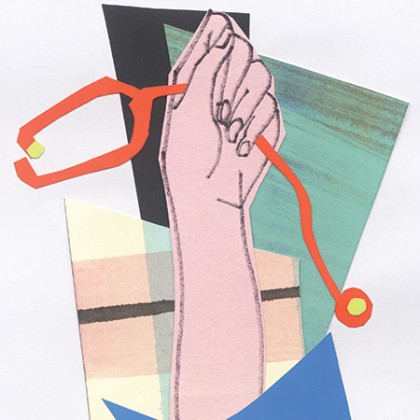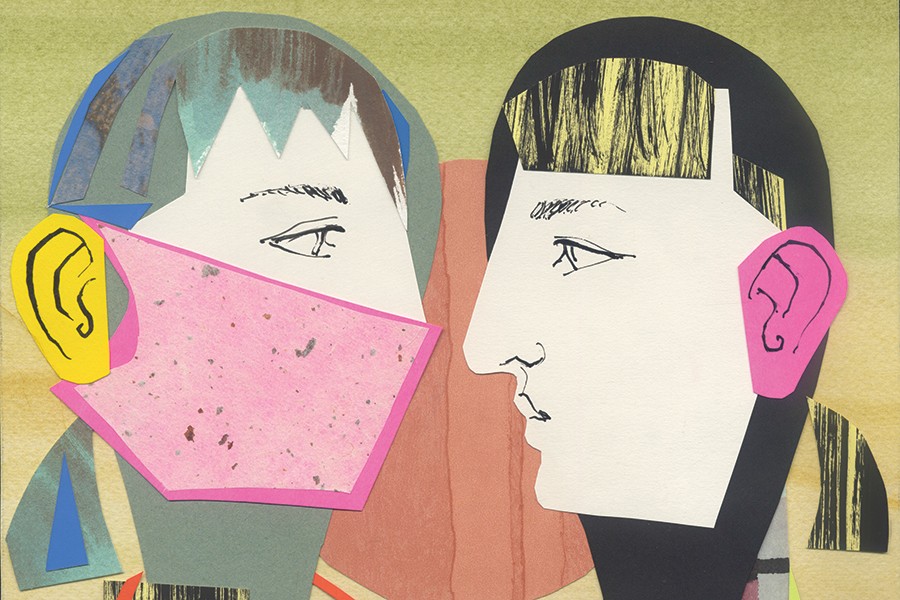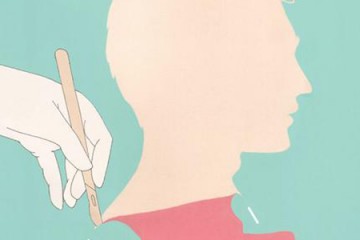The couple looked over at what they had been told was their stillborn baby. But as the baby, born at 22 weeks, lay on the warmer, the parents could see that the heart was still beating.

Image credit: Cornel Rubino
Doctors knew the baby had no chance of surviving, so they hadn't told the parents that their child still had a heartbeat. The physicians didn't want to upset them. But the couple saw, and the father spoke up. A nurse swaddled the baby and handed it to the mother. "The mom felt, 'Oh my gosh, those were precious moments that were lost. I could have been holding the baby that whole time,'" says Naomi Cross, a registered nurse who at the time was new in her role as a perinatal bereavement coordinator for Johns Hopkins Hospital. She was called in to talk with the couple about what had occurred.
"I had to go back to the doctor and say, 'We can no longer make decisions [about what to tell parents] because we are afraid to hurt their feelings or offend them. We need to give them all information.'" In this case, that meant saying, "Your baby's heart is still beating. Would you like to hold him?"
Cross had witnessed a gray area—a situation where doctor, nurse, patient, and family may not see eye to eye, not because one is right and everyone else is wrong but because there is no cut-and-dried answer. Here, the question was how to treat the parents of a newborn baby who barely has signs of life. Cross felt that an infant should be regarded much the same as an elderly hospice patient: The patient's death may be imminent, but his vitals should still be recorded, the family should be kept informed on his status, and loved ones should be given resources to cope with the loss. And she started to see that discussions about ethics were not a regular part of the patient care routine. Talking about the loss of a baby is a taboo, she says, and doing so makes people uncomfortable. Cross felt that this patient, like others, had not been given the proper standard of care.
As perinatal bereavement coordinator and bedside nurse for the Department of Gynecology and Obstetrics, Cross worked to change her department. She talked to administrators about providing grief resources, to benefit not only patients but also the hospital's bottom line; she showed her higher-ups scholarly articles that indicated candor about how difficult situations would not cost the hospital revenue by dissuading people from returning for future care. She educated colleagues about Maryland statutes on recording health care data even when a patient's death is imminent. She started hosting bereavement training for incoming nurses and residents. It wasn't easy, and she was often met with opposition. "Some days, I felt like I was banging my head against a wall," she says. "In the beginning, I was cussed at. I was cussed at by professionals—by doctors and nurses. I think that I had to really develop a tough skin, and I had to come at it from a very rational standpoint, and, sadly, from a monetary standpoint." It was an uphill battle, but she says she slowly started seeing progress throughout her department—nurses being sent to her with questions, or colleagues sharing information she had taught them.
In January, after several years in this role, Cross transferred to the pediatric emergency department. "I was burned out, I really was," she says. "I felt like I needed my own support group for bereavement coordinators."
For nurses, such situations are not rare. Every day in every department of every health care organization, nurses grapple with ethical challenges. All too often, in the daily grind of nursing, ethics are not discussed. But when they are ignored, nurses burn out. Sometimes they leave their jobs. And with the demand for capable nurses constantly increasing, experts say that has huge implications for the future of health care.The ethical dilemmas faced by nurses include everything from speaking up about how a staffing shortage impacts quality of care to deciding how to allocate scarce resources like donor organs or blood. They encompass birth complications and end-of-life issues and just about everything in between. The matter becomes even more complicated when you factor in that each nurse has his or her own personal set of ethics shaped by upbringing, personal history, religion, race, and so on. The unifying elements, according to the American Nurses Association's Martha Turner, are that either the nurse is unclear about the right thing to do, or the nurse can see what should be done but cannot do it (because, for example, hospital policy forbids it).
While ethics impacts every health care worker, experts say nurses face unique challenges. They often spend more time with patients, so they are more likely to understand what the patient wants and how the family feels. Nurses are the ones who most often see patients and family members struggling to make crucial, sometimes excruciating decisions. They're often the ones who know that the patient or the family is not comfortable with current treatment. "The difference for nurses is we have prolonged engagement with patients and families," explains Jennifer Wenzel, an associate professor in the School of Nursing with joint appointments in the School of Medicine and the Kimmel Cancer Center. "We experience with them the frustrations. We're very closely connected experientially, and that's different. It puts nurses in the thick of things, ethically. And then when you add in that we all have our own ethics and beliefs that may collide with the patient's or the organization's or other caregivers' set of ethics, it's complex and it's messy."
"Nurses, like everyone else, have personal values," adds Cynda Rushton, a Johns Hopkins professor of bioethics with joint appointments in the School of Nursing and the Berman Institute of Bioethics. "And sometimes those values are in conflict with what their patient may be asking them to do or participate in. Nurses have to find a way to reconcile their own moral values with the obligations of their profession."
Cross' experience in the delivery room was seen through her own unique lens—when she was 14, she was raped. She awoke one morning feeling nauseous and suffered a miscarriage in bed. She says she didn't know how to cope with the loss and experienced symptoms of post-traumatic stress disorder. That experience has followed her through life and was a big part of her decision to become a champion for girls and women dealing with loss. While she chose to put herself in this situation, many nurses don't get to choose. They are more often in a support role and don't get to elect whom they care for, even if that comes into conflict with their values. "Nurses aren't often in the position where they can opt out of providing care for patients," Rushton says. "Physicians, on the other hand, often have a contractual relationship with patients. They can make decisions on whether they're going to provide services to them, whereas, for nurses, that option is quite limited in general. You generally get assigned based on what patients need, not what you want, not what you prefer. And what that really highlights is that we take care of everybody, regardless of their diagnosis, their gender, their culture, their socioeconomic status, their race. We take care of everybody."
Rushton says the nation is at a tipping point in health care. With more than 3 million nurses in the United States—the largest segment of the health care workforce—any conversation about impending challenges of caring for aging baby boomers or the advancement of technology is deeply tied to nurses and can lead to new ethical challenges and moral distress. Just because new technology can keep a patient alive, does that mean it's the right thing to do? How best to allocate limited resources to a growing patient population? How can hospitals continue to deliver quality care for ever more patients when the workforce is not growing at the pace needed to keep up?
Ethics can be the elephant in the room. Nobody wants to talk about it, but it's not going anywhere. People aren't always comfortable talking about the deeply held personal values that shape their personal sense of ethics. They fear being judged, or confronting people who see a situation as categorically right or wrong instead of shaded by individual ethical considerations. It's a gray area in a profession that values black and white, that values precision and decisiveness. Is the bone broken? Does the patient have an infection? Has the tumor spread? What is the dosage? What is the prescribed treatment? "Coming up with the right answer is a huge part of medicine, and when you can't feel confident that you came up with the right answer, you might think, 'I just would rather not get into that territory,'" Rushton says.
Moreover, nurses may be too busy to stop and think about some of their frustrations as actually involving ethical dilemmas. "Often, we think about ethics as separate, that thing we do when everything else is done," Rushton says. "In fact, ethics is part of everything we do. It's embedded in our choices, in our behavior, in our character, in how we do our work every day. When you think about ethics in that way, it's important for the foundation of nursing to be grounded in ethical values so that we've got a firm foundation to operate from."
"Some of these situations are serious enough that we see nurses leaving the profession," Wenzel says. "They can escalate to the point where people feel like, 'I can't do this work anymore.' I'm not saying they stand up in the middle of it and leave right there, but it can be upsetting to them to the point where they say, 'I'm not happy about this and I don't want to put myself in this situation again.'" Says Rushton, "I've had many opportunities to choose other professions, and I wouldn't choose anything else. And I see nurses who start their careers, and they have that same passion. And then when I see them two years later, they are depleted and burned out, and to me there's something wrong with a system that does not engage that passion and commitment. It's a loss. It's a big loss to the profession, and also to the people we try to serve. It does no one any good to expend the time and energy to train nurses and then have them leave the profession in less than two years. That is not a good return on investment."
Rushton is a leading force in nursing ethics. As a professor of clinical ethics as well as a professor of nursing and pediatrics, her personal mission is to give nurses a voice and to see conversations about ethics happen on a daily basis as a part of routine health care, instead of being an afterthought or occurring only when things reach a boiling point. She's been working on it for more than 30 years and feels like she's making headway.Rushton speaks with an enthusiasm and optimism not always associated with conversations about death, moral distress, and professional burnout. "I tend to focus on the glass half full," she says as she describes programs and initiatives at Johns Hopkins that seek to prompt conversations about ethics, particularly among nurses. She starts by describing the Johns Hopkins Hospital Ethics Committee and Consultation Service, of which she is a co-chair. The committee provides recommendations to health care workers, patients, and their families on how to proceed in cases where ethics are a factor. Rushton says nurses are a big part of its consultations. She gives the example of an elderly man with cancer who now was going to die. He had undergone multiple operations on his abdomen, which had left him with a host of complications. The man and his family knew that death was imminent, but they requested that he continue to receive donor blood until he passed away. The medical team, including the nurses, understood the family's wishes but faced a dilemma: Donor blood was in limited supply, and a transfusion now would not help the patient. So the ethics committee was called in. They spoke with the family and conveyed that unlimited transfusions in this case were ethically unjustified.
Rushton says she wants such conversations to happen before there is an ethical crisis or confrontation. She and her colleagues have begun to lead ethics rounds, during which they meet with the health care team, patients, and families to normalize conversations about ethics. To the health care team: How do you feel, ethically speaking, about the current course of care? Have you discussed the ethics with the family? To family members: If the patient could speak right now, what would she want us to do? Has she expressed any preferences in the past? The rounds are almost like educational icebreakers—they rotate among departments as a way to jump-start conversations about ethics. Rushton says her hope is that even after she leaves the department, health care teams across the hospital will continue to think and talk about ethics in everyday practice.
While many hospitals have codes of conduct or guidelines to ensure quality and safety, fewer give the same attention to ethics. The Johns Hopkins Hospital's Code of Ethics in Patient Care articulates the hospital's values—respect for cultural traditions, patient autonomy, confidentiality, and so on—and how those values should apply to decisions on everything from mandatory flu vaccinations to allocating scarce supplies, staff, and space. Individual departments are taking steps to do what they can, as well. The Kimmel Cancer Center, for example, has initiatives in place to support nurses as they deal with the moral distress that comes with treating long-term cancer patients, according to Sharon Krumm, administrator and director of nursing for the center and an associate professor at the School of Nursing and School of Medicine. The center has a staff chaplain to discuss dilemmas with nurses, and she feels her team is empowered to speak up. They are also aware of the available options for consultation. "I think it's really an expectation that people speak up and speak out," she says.
The School of Nursing has a dedicated ethics and theory course for master's students, which provides tools for identifying and addressing ethical issues for practicing nurses. The course, co-taught by Wenzel and Rushton, has students role-play scenarios, draft position papers, and engage in debates. Rushton gives an example scenario: You're the nurse who thinks the patient's pain is not being managed properly, but the doctor says he will not increase the dosage. What do you say? How do you react? Are you willing to bypass the doctor and go up the chain of command?
Students who go through the course often may know how they feel about a scenario but have trouble verbalizing why they feel that way, Wenzel says. By having discussions and debates, students learn not only about their own values but how to empathize with those on the other side of the argument. "If you don't understand the rationale behind something, it's easy for you to become more entrenched in your position, and even to feel very emotional about situations and areas of disagreement," Wenzel says. "I think if you can understand the other person's position and understand that there's a rationale for it, it doesn't necessarily mean you will agree with them, but it at least forms that basis for understanding where they're coming from, for meaningful dialogue, and, hopefully, for some resolution."
Everyone admits there is always more that can be done. In many departments, despite efforts to spur conversations about ethics, those discussions still don't happen as often as they should. There is too little time, money, and staffing. When nurses get busy, ethics may go on the back burner. For Krumm the biggest problem is staffing. When budget cuts strike, nurses are hit hard, as nursing is the Kimmel Center's largest expense. That can lead to overworked and overwhelmed nurses who feel they can't give the best care. "It sort of sends a message of devaluing what the nurse does. If your numbers are cut, you can't sit and hold a patient's hand while they're working through some emotional issues because you've got two IVs to hang," she says. "The tasks begin to overwhelm you, and it's very dissatisfying if you cannot provide the level of emotional care and comfort that the patients are asking for or need." Rushton says, "We are ahead in some areas and have room for improvement in others. There's always more that we could be doing. It's a matter of resources, honestly."
The path to nursing was more of a squiggle than a straight line for Brian Wise, Nurs '14. After getting a bachelor's degree in philosophy, Wise enrolled in seminary school. He was halfway to a master's degree in divinity when, as he describes it, "I stopped believing in God as a literal thing." Part of what drew him to theology had been the ability to help people struggling with moral decisions. "Ethics and moral systems are the why we do what we do," he says. "That's so important in life."He sees nursing as similar to theology that way. After graduating from the School of Nursing last year, he took a position in Johns Hopkins Hospital's pediatric ICU. Nurses play a balancing role, he says: learning what's best for the patient, what the family wants, and what the health care team has planned. Especially in the Hopkins PICU, where the sickest of sick kids end up, he says nurses play that role against a backdrop of ever-advancing technology that can keep these kids' hearts pumping, perhaps when that's not the best thing. "We haven't been able to keep up with how quickly technology has been advancing," he says. "Is it OK for these kids to be kept alive indefinitely with questionable quality of life, questionable consciousness? Or are we just doing that because that's what the family wants. And is that OK?"
He cites a recent case. The patient was a child with a complex medical history and a poor prognosis. The patient's doctors and family were talking about more invasive procedures that would be painful and hard on the child. Children are resilient, Wise says, and they can surprise with how well they respond to a procedure. But there's always a chance that the doctor will go forward with a painful, invasive procedure only to have the child die anyway. Wise was asked by the parents what he would do were the roles reversed. "To have to help somebody make a decision like that, that's a decision that I would never want to have to make for my kids," he says. "I've got three kids of my own, and I can't imagine what it would be like to put yourself in the family's shoes. When they asked me what I would do, it was hard to even know how to respond to that. But we did end up having a good conversation about the patient as a person, about what clues the child had been giving as to whether they could survive something like this. We're in the middle of families trying to wrestle with decisions that nobody ever wants to deal with, and I don't know that there is always a right answer. It's so complicated and murky."
Wise says issues like this are constantly discussed, but usually it's in the break room. "Very rarely do any of those conversations result in anything constructive. It's more like, 'We're in this bad situation, and our job is to keep these kids alive, even if we don't think that's the best thing for them.' "
Nurses need to be trained and intent on acknowledging and discussing the ethical challenges they face, he says. With his background in philosophy and theology, as well as ethics training in nursing school, he thinks he's pretty good about taking a step back and articulating what ethical issues are at play and why they're bothering him. But he knows he's in the minority. Wise is working with Rushton and others on a moral distress research project in the PICU, where he's asking doctors, nurses, respiratory therapists, and other health care workers what brings on moral distress and how they deal with it. "Almost nobody we talked to had any training, no matter what their background was," he says. PICUs generally have a high turnover rate, he notes, and new employees are understandably more concerned with learning the mechanics of the job—where equipment is, who does what, and so on—than with conversations about ethics. But it's necessary.
There's a nationwide shortage of nursing faculty, and only a small percentage of those instructors have been educated in ethics, Rushton says. Many of the instructors who do lead ethics courses have no formal background. "Many places would say that ethics is integrated in their curriculum," Rushton says, "which means that it can be pretty invisible." The problem is then exacerbated by a lack of continuing education opportunities focused on ethics. Seldom will you hear about formal ethics training for working nurses, or even brown-bag lunches to discuss the topic. "There's a huge need for nurses who are in practice to continue to work on those issues in continuing education. There are just huge gaps everywhere," Rushton says.
To Rushton, all the forces at play in the past year have finally started coming together so that real change could be effected in policy, education, and research. "Now people are going, 'Oh, OK, yeah. That makes sense,'" she says. The American Nurses Association spent much of the past year preparing to release the first revision since 2001 to its Code of Ethics for Nurses with Interpretive Statements, which serves as guidelines for ethical practice for all nurses. Released in January, the updates don't change the foundation of the document but include "small changes in perspective and focus," says ANA's Martha Turner, the co-lead writer for the project. The changes are intended to reflect the evolution of the health care landscape and technology. Among the material changes, Turner says, is the addition of terms like "social media" and "genetics." The ANA celebrated the release by dubbing 2015 "The Year of Ethics." "This Year of Ethics is a really good kick-starter for getting the conversation going because so much of it is raising nurses' awareness," Turner says. "I think it happens much more so than it used to, but nurses still have a difficult time with many of these issues."Just months before, Rushton made her own major contribution. In August 2014, 50 nursing leaders came together in Baltimore for the first-ever National Nursing Ethics Summit, conceived by Rushton and sponsored by the School of Nursing and the Berman Institute. She says Johns Hopkins is the perfect forum for discussions of nursing ethics, given its history. Isabel Hampton Robb, who in 1893 wrote Nursing: Its Principles and Practice, widely regarded as the first nursing ethics textbook in the United States, was the first superintendent for nurses at Johns Hopkins. "This is a continuation of a long tradition here," Rushton says.
The summit helped break down boundaries that sometimes exist between nursing organizations, she says, to unite the voices of educational organizations, professional nursing nonprofits, policymakers, and others with a stake in the profession. Its resulting Blueprint for 21st Century Nursing Ethics laid out, step-by-step, what could be done to ensure that nurses are prepared through education and supported in clinical practice. The blueprint also addressed the need to track the outcomes of these efforts through additional research. "One of the things that happened at the summit, particularly for nurses who have focused their work on ethics, was kind of a moment of realizing we've arrived at a place where things are actually happening," Rushton says. "The fact that we're all together suggests that there's possibility, that things can be different, and that our voices are actually being heard in a different way.
"It happened in an amazing way. The revision of the Code of Ethics and the summit, all of that sort of coalesced together to create a kind of momentum that has never happened before. It's not just one little voice out here making noise. Now we've got a collective voice."
One of the most exciting things to come out of the summit, she says, is engagement with student leaders. After the summit, a group of Hopkins nursing students worked to get the National Student Nurses' Association's House of Delegates to pass a resolution supporting the vision laid out in the summit's blueprint. "Our resolution was about signing a pledge that states how you plan on personally committing to upholding ethics," says Heather Reinig, the Hopkins nursing student who was the main author of the resolution. "It's trying to promote a personal commitment and leadership in ethics among nursing students." She points out that today's nursing students will be tomorrow's nurses, and it's important to prepare them to think about ethics as they prepare to go into direct patient care. In April, Rushton was invited to serve as keynote speaker for the association's national convention. She says it's thrilling to see students getting involved, leading the charge for the next generation of nurses.
Ever the optimist, Rushton thinks it's possible to mobilize the collective voice of nurses to participate in conversations with policymakers, hospital administration, physicians organizations, and insurance companies to create a culture where ethical practice is valued and encouraged. Above all, she says, "we want to get to a place where it's safe for nurses to speak up and speak out. We want it to be normative that people are expected to speak out. It should not be a heroic act to say, 'Look, here's an unsafe situation,' or, 'Here's a situation where we are really compromising our ethical values.' And to me, that would be a huge step, if every nurse could be prepared to speak up and speak out with confidence, and they could actually advocate for their patients and themselves in a more forthright, clear way. That would be a good outcome."
Jeanette Der Bedrosian is the magazine's assistant editor.
Posted in Health, Politics+Society
Tagged nursing, bioethics, berman institute of bioethics, ethics











